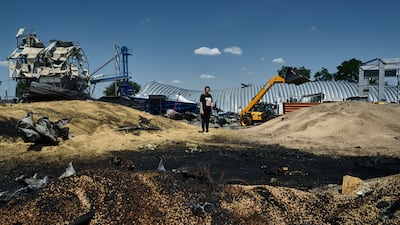Russia followed its withdrawal from a grain export deal by expanding its operations in Ukraine's Odesa area from hitting port infrastructure to farm storage buildings on Friday, while also attempting a Black Sea blockade.
Russian missiles also damaged what officials described as an “important infrastructure facility” south-west of the port city of Odesa, in an effort to cripple Ukraine economically.
Attacks in recent days have put Odesa in Russia’s crosshairs after Moscow abandoned a deal that allowed Ukraine to send grain through Black Sea ports.
In the attack on the storage site, two cruise missiles started a blaze, then another struck during firefighting efforts, regional Governor Oleh Kiper said.
The barrage injured two people, damaged equipment and destroyed 100 tonnes of peas and 20 tonnes of barley, Mr Kiper said.
Russia targeted Ukrainian grain export infrastructure in response what it said was a Ukrainian attack that damaged a road bridge between Russia and the Crimean Peninsula.
Russia and Ukraine have said they will treat ships travelling to each other’s Black Sea ports as potential military targets.
Russia’s Deputy Foreign Minister Sergei Vershinin clarified the Defence Ministry’s announcement this week that Moscow has declared wide areas of the Black Sea as dangerous to shipping.
The ministry said it would consider incoming vessels as laden with weapons and treat the country of its flag a participant in the conflict on the Ukrainian side.
Mr Vershinin said the Russian navy will inspect the vessels to make sure they are not carrying military cargo before taking any other action.
“There is no longer a sea humanitarian corridor, there is a zone of increased military danger,” he told a news briefing.
Mr Vershinin added that Russia will fulfil the needs of African countries despite the deal's end. President Vladimir Putin has promised to provide poor countries in Africa with grain at no charge.
The Institute for the Study of War, a Washington-based think tank, said the recent strikes against port and grain infrastructure and threats of escalation at sea “are likely a part of a Kremlin effort to leverage Russia’s exit from the Black Sea Grain Initiative and exact extensive concessions from the West”.
In Turkey, President Recep Tayyip Erdogan said western countries should address Russia’s demands agreed to in the deal to restore the Black Sea grain corridor.
“Russia has some expectations. If these are overcome, Russia is in favour of the active work of this grain corridor,” said Mr Erdogan, who helped negotiate the deal.
“We know that (Mr Putin) has some expectations from western countries. Western countries need to take action on this issue.”
He said he would talk to Mr Putin by phone and hoped to meet him in Turkey next month.
In comments reported by state-run news agency Anadolu and other media, Mr Erdogan said that the end of the grain initiative would raise global food prices, increase famine and cause waves of migration from poor countries.
Ukrainian President Volodymyr Zelenskyy said he spoke with Mr Erdogan by phone on Friday, and they “co-ordinated efforts to restore the operation of the Black Sea Grain Initiative”.
“Unlocking the grain corridor is an absolute priority,” Mr Zelenskyy said on the Telegram messaging app.
The Russian Defence Ministry said the navy conducted drills that simulated action to seal off a section of the Black Sea. In the manoeuvres, a missile boat fired anti-ship cruise missiles at a mock target.
The ministry also said it fired long-range sea-launched weapons on facilities “used for preparation of terror attacks against the Russian Federation involving drones”, adding that “all the designated targets have been hit.” It did not elaborate.
Mr Putin, meantime, repeated his claim that Ukraine’s much-anticipated counteroffensive is failing.
Mr Putin, whose authority was shaken last month by a short-lived rebellion from a Russian mercenary force, told the state security council that the Ukrainian military has suffered heavy losses of fighting men and materiel and the West is struggling to maintain supplies of weapons and ammunition.
Mr Putin also spoke about Poland, alleging that Warsaw has formed a military unit to ensure security in western Ukraine and plans to interfere in Kyiv’s affairs.
In other developments, Mr Zelenskyy announced the resignation of the country’s culture minister, suggesting the ministry’s spending was misguided during wartime.
“Paving stones, city decorations, and fountains can wait till after the victory,” he said.
Recent scandals have involved local authorities, such as the repair of a cobblestone road in central Kyiv and renovation of a fountain in a western Ukraine city.
Mr Zelenskyy also fired the Ukrainian ambassador to the UK, Vadym Prystaiko, who was also ambassador to the International Maritime Organisation.
He gave no reason, but Mr Prystaiko had publicly criticised the president.



















